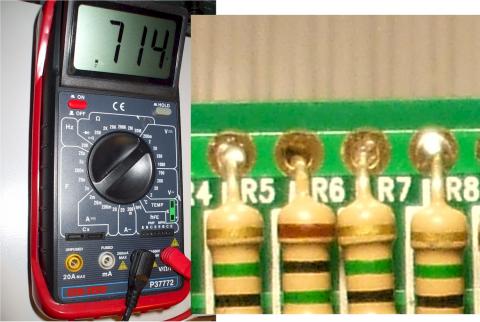Product Review : Cold and incomplete soldering in CEN-TECH P37772 multimeter cause erratic readings

I picked up a CEN-TECH P37772 11 Function Digital Multimeter with Transistor Testing, Audible Continuity feature, support for type K thermocouple and more functionality for $5 at a recent sale. These sell new for $20 at Harbor Freight so that seemed like a reasonable price to me. It is a great meter, but I noticed that it just couldn’t be used on the 0 to 2 VDC or 0 to 20 VDC scale. The reading jumped erratically to the point where the meter just could not be trusted.
With only $5 at stake, I boldly went past the "This instrument contains no operator serviceable parts" and declared myself eligible for ”Screw removal by qualified persons only" as engraved on the back.
The meter opens simply enough with 3 Phillips screws. The function selector attaches to the main frame with 4 more screws which I removed. I initially thought the problem was of contact contamination as I had no information on where the meter was used or stored.
I cleaned the contacts with a cloth and a dab of alcohol, and very lightly polished the contactor with fine emery paper. But something with the soldering caught my eye, and I pulled out my 30x Jeweler’s loupe for a closer look.
There were several joints along the edges of the contactor board that were incompletely or cold-soldered. There was a section I was able to micro-photograph that showed cold, incomplete and a good joints all next to each other. A cold soldered joint does not have a reflective surface and the solder just doesn’t look like it has flowed around the wires. See joint in photo for R5 and R7. Just to the right of the R5 joint, you can see hint of shadow from the camera flash which is another indicator of poor connectivity. An incomplete soldered joint will have gaps between the component wire and the circuit board. See joint for R6 for example. What we need are connections like next to R8 which looks good to me.
Just to be sure, I fixed up all the joints and reheated every joint on the board to my liking. A few minutes on the bench with a pencil-tip soldering iron, then checking with the 30x jewelers loupe and an operational test confirmed the problem was solved.
Despite requiring a bit of final-assembly by user, I actually really like this meter. The LCD display tilts up for easy reading, the probes are high quality and it comes with a shock-absorbing wrap around case that fits well with the work in my shop.
I bought a type K thermocouple PETES PLUG PROBE part number FK26M from digikey.com ( digikey p/n 290-1979-ND ) and it works great for checking temperature of BBQ meat. I certainly feel this meter was worth the $5 it cost me and I am optimistic this device will serve me well like my Sansui 771.